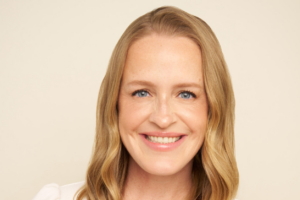Report: How investing in employees bolsters the bottom line
Data from Accenture shows the clear correlation between demonstrating care for your workforce and higher revenues—despite the COVID-19 downturn. Here’s where you can create the biggest impact.
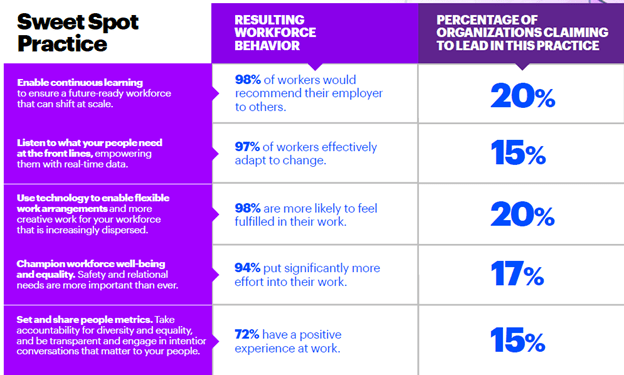
Executives’ expectations, priorities and responsibilities are changing.
According to a new report from Accenture, just 35% of C-suite leaders before the pandemic saw themselves as being responsible for the well-being of employees and holistically supporting their needs. Six months later, that number has jumped to 50%.

Even though global unemployment is high due to the COVID-19 pandemic, many workers are reevaluating their careers. More than half of workers are contemplating a career or job change, Accenture reports.
For organizations eager to retain top talent, it will be crucial to show exemplary leadership post-COVID.
In Accenture’s pulse survey, 69% of workers said that they expect companies to start behaving more responsibly and equitably than before, and 67% say that COVID-19 has proved that business leaders must engage on issues such as social inequality and environmental conservation.
In short, employee trust will come at a premium for organizations after the global pandemic.
A new model
Accenture offers a new model for thinking about the well-being of employees that it calls “Net Better Off.”
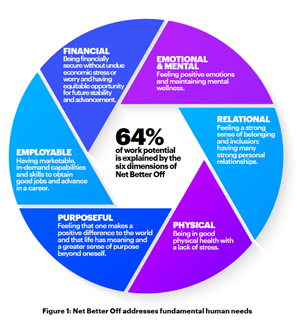
Accenture says the data confirms that 64% of employees’ work potential can be measured by these six keys:
- Fair compensation without fears about future stability and advancement.
- Emotional and mental. Mental health and a positive outlook on work and the workplace.
- Having marketable and in-demand skills to advance in a career.
- Feeling that one makes a positive difference in the community and wider world.
- Being in good health and avoiding stress.
- A sense of belonging, inclusion and strong personal relationships.
Accenture calls its model “Net Better Off” because these keys have a direct impact on the bottom line, and organizations that invest in their employees see—on net—more revenue.
Organizations that follow the model in 2020 see on average a 5% increase in revenue compared to the negative 4.7% loss that is the average for organizations during the COVID-19 crisis. That’s true even for the 87 firms in the S&P 500 that were forced to reduce their workforce this year.
Cuts and offering a holistic approach to employee wellness are not mutually exclusive.
Questions to ask
Accenture offers questions to ask regarding each employee wellness category to discover how your organization is performing.
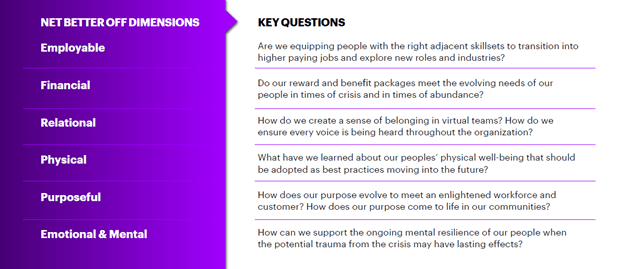
To promote better outcomes, Accenture says there are five practices that warrant the most investment, which it calls the “sweet spot.”
Notably, most organizations interviewed for the study show that they have room to grow on these areas of investment, with only 15%-20% of chief executives rating their organizations as leaders on one of the five actions:
- Enable continuous learning.
- Listen to what frontline employees say they need.
- Use technology to offer flexible work arrangements.
- Be a champion of well-being and equality in the workplace.
- Be accountable with publicly shared goals and metrics.
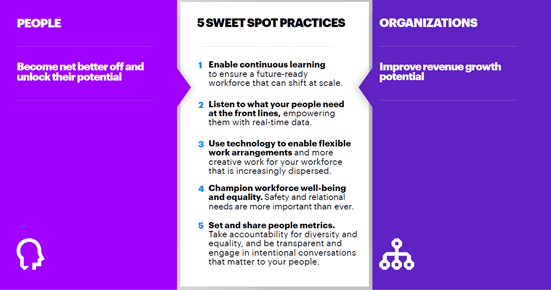
Companies are most likely to say they are leaders in flexible work arrangements or offering continuous learning, but there is still plenty of room for improvement. On both of those actions, 98% of employees says they would be more likely to recommend their employer to others and are more likely to be more fulfilled in their work.
Companies report the most room to grow on actions like listening to frontline employees and sharing public people metrics.

Embracing empathy
Business leaders are facing a new era where an organization’s ability to show care for employees and stakeholders will be fundamental to its future success. It’s a principle that has been emerging in recent years. The stakeholder model of capitalism got a ringing endorsement in 2019 from Business Roundtable, and many organizations have set themselves up as leaders on “purpose.”
Accenture argues that embracing empathy as a business model isn’t a prescriptive formula that you can onboard in an afternoon, but rather a new mindset that has to be integrated into everything your organization does.
Accenture’s report focuses on the role of the CHRO, but the communications function can’t be ignored when trying to accomplish the many goals embedded in the research, from getting buy-in to demonstrating change to a remote, anxious and exhausted workforce.
The new mindset can best be described by this dynamic: Accenture says successful leaders will shift the focus “from expecting people to be worthy of their organization to making their organization worthy of the best individuals.”
Skills required
To make the shift, internal advocates and leaders on employee well-being must become jacks- and janes-of-all-trades.
Accenture asked HR professionals what skills will be required of future C-suite leaders, and they provided three concrete solutions:
- Work technologist. Make data-driven decisions and adapt to the latest tech advances.
- Steward of purpose. Strong interpersonal communications skills and an ability to strategize around social impact.
- Upskilling advocate. Sophisticated knowledge of organizational design and latest best practices on reskilling offerings.
You can read all of Accenture’s findings and recommendations by downloading the full report.



